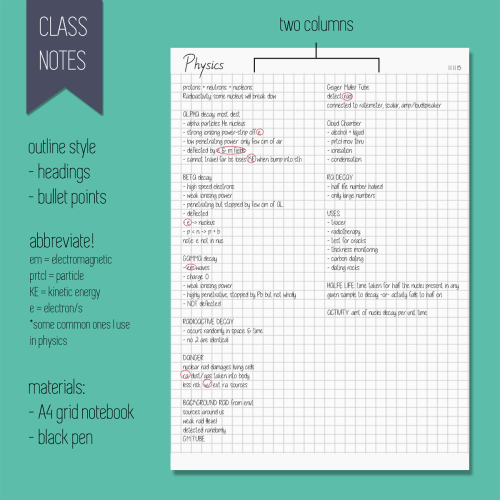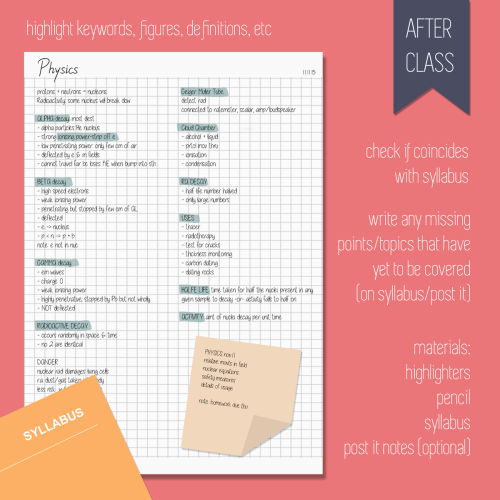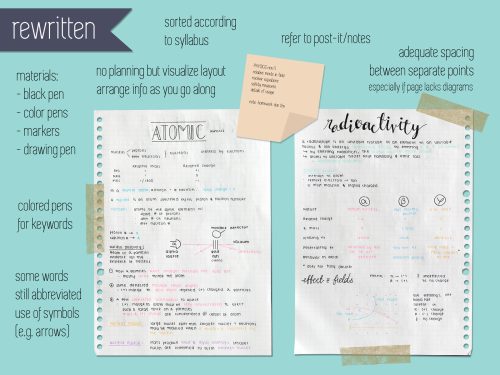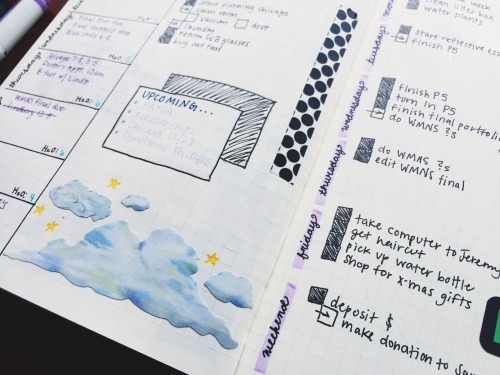Sundays And Synapses.

Sundays and synapses.
More Posts from Swirlspill-study and Others

10.23 im barely holdin on right now, having some trouble finding hope and falling in love with the world again but i will be okay
How to Study Like a Harvard Student
Taken from Sophia Chua-Rubenfeld, daughter of the Tiger Mother
Preliminary Steps 1. Choose classes that interest you. That way studying doesn’t feel like slave labor. If you don’t want to learn, then I can’t help you. 2. Make some friends. See steps 12, 13, 23, 24. General Principles 3. Study less, but study better. 4. Avoid Autopilot Brain at all costs. 5. Vague is bad. Vague is a waste of your time. 6. Write it down. 7. Suck it up, buckle down, get it done. Plan of Attack Phase I: Class 8. Show up. Everything will make a lot more sense that way, and you will save yourself a lot of time in the long run. 9. Take notes by hand. I don’t know the science behind it, but doing anything by hand is a way of carving it into your memory. Also, if you get bored you will doodle, which is still a thousand times better than ending up on stumbleupon or something. Phase II: Study Time 10. Get out of the library. The sheer fact of being in a library doesn’t fill you with knowledge. Eight hours of Facebooking in the library is still eight hours of Facebooking. Also, people who bring food and blankets to the library and just stay there during finals week start to smell weird. Go home and bathe. You can quiz yourself while you wash your hair. 11. Do a little every day, but don’t let it be your whole day. “This afternoon, I will read a chapter of something and do half a problem set. Then, I will watch an episode of South Park and go to the gym” ALWAYS BEATS “Starting right now, I am going to read as much as I possibly can…oh wow, now it’s midnight, I’m on page five, and my room reeks of ramen and dysfunction.” 12. Give yourself incentive. There’s nothing worse than a gaping abyss of study time. If you know you’re going out in six hours, you’re more likely to get something done. 13. Allow friends to confiscate your phone when they catch you playing Angry Birds. Oh and if you think you need a break, you probably don’t. Phase III: Assignments 14. Stop highlighting. Underlining is supposed to keep you focused, but it’s actually a one-way ticket to Autopilot Brain. You zone out, look down, and suddenly you have five pages of neon green that you don’t remember reading. Write notes in the margins instead. 15. Do all your own work. You get nothing out of copying a problem set. It’s also shady. 16. Read as much as you can. No way around it. Stop trying to cheat with Sparknotes. 17. Be a smart reader, not a robot (lol). Ask yourself: What is the author trying to prove? What is the logical progression of the argument? You can usually answer these questions by reading the introduction and conclusion of every chapter. Then, pick any two examples/anecdotes and commit them to memory (write them down). They will help you reconstruct the author’s argument later on. 18. Don’t read everything, but understand everything that you read. Better to have a deep understanding of a limited amount of material, than to have a vague understanding of an entire course. Once again: Vague is bad. Vague is a waste of your time. 19. Bullet points. For essays, summarizing, everything. Phase IV: Reading Period (Review Week) 20. Once again: do not move into the library. Eat, sleep, and bathe. 21. If you don’t understand it, it will definitely be on the exam. Solution: textbooks; the internet. 22. Do all the practice problems. This one is totally tiger mom. 23. People are often contemptuous of rote learning. Newsflash: even at great intellectual bastions like Harvard, you will be required to memorize formulas, names and dates. To memorize effectively: stop reading your list over and over again. It doesn’t work. Say it out loud, write it down. Remember how you made friends? Have them quiz you, then return the favor. 24. Again with the friends: ask them to listen while you explain a difficult concept to them. This forces you to articulate your understanding. Remember, vague is bad. 25. Go for the big picture. Try to figure out where a specific concept fits into the course as a whole. This will help you tap into Big Themes – every class has Big Themes – which will streamline what you need to know. You can learn a million facts, but until you understand how they fit together, you’re missing the point. Phase V: Exam Day 26. Crush exam. Get A.

as requested by quite a few people - a masterpost of educational podcasts. links go to either the site or the itunes podcast store. an excerpt of the description is included with each.
* indicates a podcast that i listen to regularly
entertainment
*welcome to night vale - twice-monthly updates for the small desert town of night vale
*muggle cast - everything harry potter
general information
radiolab - investigation told through sounds and stories, and centered around one big idea
*stuff you should know - about everything from genes to the galapagos
*stuff mom never told you - the business of being women
tedtalks
good job, brain - part pub quiz show, part offbeat news
news
no one knows anything - the politics podcast from buzzfeed news
wait wait…don’t tell me - weekly current events quiz
college
*college info geek - the strategies and tactics the best students use
*getting in - your college admissions companion
math
math for primates - a couple of monkeys who decided that arguing about mathematics was a better use of their time than throwing poo at one another
math mutation - fun, interesting, or just plain weird corners of mathematics
science
60 second health - latest health and medical news
the naked scientists - interviews with top scientists, hands-on science experiments
60 second science - the most interesting developments in the world of science
startalk - astronomy, physics, and everything else about life in the universe
nasa science cast - science behind discoveries on earth, the solar system, and beyond
history
*myths and legends - myths, legends, and folklore that have shaped cultures
stuff you missed in history class - the greatest and strangest stuff you missed
the podcast history of our world - from the big bang to the modern age! …eventually
witness - the story of our times told by the people who were there
the history chicks - two women. half the population. several thousands years of history.
entrepreneurship & finances
practical money matters - better managing their finances
the internet business mastery - learn how to create an internet based business
social triggers insider - the fields of psychology and human behavior
listen money matters - honest and uncensored, this is not your father’s boring finance show
writing & literature
professional book nerds - it’s our job to discuss books all day long
a way with words - words, language, and how we use them
grammar girl - short, friendly tips to improve your writing
classic poetry aloud - recordings of the greats poems of the past
language
esl (english) - improve english speaking and listening skills
language pod
coffee break
search in your podcast app for specific languages!
art
99% invisible - exploration of the process and power of design
tips and tricks photography
the arts roundtable
hobbies & other
stash & burn (knitting)
practical defense - staying safe in our increasingly dangerous urban environments
zen and the art of triathlon - a triathlete’s view on living the multisport life
the art of charm - make you a better networker, connecter, and thinker
the indoor kids - isn’t just about video games, isn’t not about video games
rationally speaking - explore the borderlands between reason and nonsense
the dice tower - board games, card games, and the people who design and play them
motivational & inspirational
back to work - productivity, communication, work, barriers, constraints, tools, and more
personal growth podcast - classic and contemporary self development audio
what it takes - conversations with towering figures in almost every field
here be monsters - exploring the dark corners of the human mind
on being - the big questions of meaning with scientists, theologians, artists, teachers
I need advice. I've always had a problem with my grades. I've failed a lot of classes, not because I don't understand, just because I'm so depressed I can't find the motivation to do a single thing. I know that this year I NEED to get good grades. Report cards are almost out. Im more depressed now then ever. I have bad grades at the moment. I just recently learned that I have to put my cat down, and that is making it hard for me to even speak, let alone get stuff done. Any advice
/hugs/ I’m so sorry to hear that you’re going through a rough time. Especially with your cat.
First thing is first: take time. From what you’ve written, it doesn’t sound like the content of your classes is causing you trouble. Rather, it seems like there’s external factors that’s preventing you from studying - circumstances which are triggering your depression etc.
Studying with depression is difficult. Consider professional help as an option. Rely on your support network. Learn to forgive yourself for not performing at your best because of your mental illness. Remember - it is something to be managed; not a barrier to your success.
I’d also consider speaking with your faculty/ advisor etc. There may be formal avenues of review or adjustments to where/ when you take your exams and/or deadlines that may help relieve the stress in the interim as you get back on your feet.
Here’s some tips re: motivation
Five Practical Study Tips to Keep Motivated in School by @nag-aaral/ @sadgirlstudying (working link by @pas-au-talent)
Motivation by @areistotle
Motivation masterpost by @elkstudies
Motivation masterpost by @artkidstudies
Tips for avoiding burnout and staying motivated by @coffeesforstudiers
And for dealing with failure:
Dealing with Failure
Shit Grade? Feeling better after a terrible exam
This response
And this one
And this one here
On Bad Semesters by @post–grad
This Masterpost by @areistotle
How to Fail by @psychstudyblr
Good luck - give yourself time. Focus on “how” (not just a demand - ‘need’) to get exams. Celebrate your victories - not matter how small. Because it’s going to be a slow process. But you’ll get there. It may not be the ‘perfect’ solution or the perfect ‘result’ you want - but hell, we’re human. It keeps things interesting.




Note-Taking
Hey guys! So I’ve been receiving questions regarding my note-taking style and strategy for quite some time now but I believe I have never answered them in detail. The good news is, I finally decided to make a post about this (plus, I had fun making the graphics :D). Note that I am a visual learner, so my note-taking methods may not be effective for some of you, but I hope you can all learn something.
Class Notes
I only use one notebook for all my class notes, an A4 grid notebook whose pages I divide into two columns.
I use the outline method for in-class notes, which means I write information chronologically, in the order that they are taught. Some teachers do not have properly structured presentations/lessons (good thing my physics teacher does) so when in need, I use arrows to connect related information.
Abbreviations to me are one of the most important things to master when taking notes. I personally make them up as I go along. Some examples of abbreviations I use are:
w/c - which
w/ - with
cpd - compound
envt - environment
digenz - digestive enzyme
It might be confusing, but to me, knowing the context and part of speech are enough for all abbreviations to be comprehended.
Here’s an example: ‘Indonesia’s tsunami pre-warning system is made up of two types of components’ could become ‘Indo’s snmi pre-warn sys 2 type comp’.
After Class
The first thing I would do is highlight keywords and terminology (and sometimes formulas). For physics, since my teacher is relatively succinct, I don’t really highlight, but for humanities and biology, I look for words that would be expected by a mark scheme, words that are crucial to the understanding of each particular piece of information.
I would then check if the material taught coincides with the syllabus, and if not, note down any points that are missing or have yet to be taught. You could write these on a post it or on the syllabus itself, but I prefer to highlight the syllabus’ pdf file.
Rewritten Notes
My rewritten notes are arranged based on the order they appear in the syllabus unless there are pieces of information that are related to more than one topic.
I use a black pen for rewriting notes as well as colored pens to write keywords and terminology only. I know some people who write whole sentences in colored pens but to me that is ineffective; we all have our own learning styles. When making tables, I usually use different colors for different columns (see the table for different types of radiation above) which is most often the color I associate with each word. For example, water would be blue, ocean would be a darker shade, ice would be a lighter shade, and water vapor would be purple.
I still abbreviate words in my rewritten notes, but they’re not as condensed as the ones in my class notes. Another thing I find helpful is leaving a bit of space between separate points especially if the page doesn’t have a lot of diagrams. I can’t think linearly, so I can’t remember super lengthy bullet points.
I use mildliners and a drawing pen to make my diagrams (more of these in my biology notes) but I only start with pencil if it’s a complex diagram. I rarely highlight my rewritten notes, but even if I do, it’s usually only the headings and formulas.
I don’t have a rough draft for my notes, but I try to visualize the layout. I try to alternate between words and pictures/diagrams so that when I’m sitting for an exam, all I have to do is imagine that I’m looking at that page and I can remember where everything is.
Well, that’s all from me. I hope that this information could be of some use to every single one of you. Don’t hesitate to ask me questions if you’re confused about note-taking or any other problems you might have :)
hello it’s me, your grad school fairy godmother, just dropping off a
grad school application spreadsheet
so you can stay organized & track your progress more easily. a gentle reminder because the Season is upon us: i have a rad school tag & a big list of previously-answered asks here. please check both before sending me an ask about the application process :-)


This is a summary of college only using two pictures; expensive as hell.
That’s my Sociology “book”. In fact what it is is a piece of paper with codes written on it to allow me to access an electronic version of a book. I was told by my professor that I could not buy any other paperback version, or use another code, so I was left with no option other than buying a piece of paper for over $200. Best part about all this is my professor wrote the books; there’s something hilariously sadistic about that. So I pretty much doled out $200 for a current edition of an online textbook that is no different than an older, paperback edition of the same book for $5; yeah, I checked. My mistake for listening to my professor.
This is why we download.
Alternatives to buying overpriced textbooks
Textbooknova
Bookboon
Textbookrevolution
GaTech Math Textbooks
Ebookee
Freebookspot
Free-ebooks
Getfreeebooks
BookFinder
Oerconsortium
Project Gutenberg
50 Top Online Learning Sites

Rejoice fellow uni students looking for some studyspo, we urge you to take a few free lessons, as well as academic lessons provided from actual universities on several topics. Have a look at the 50 top learning sites you can find online to help you save some time.
Art and Music
Dave Conservatoire — Dave Conservatoire is an entirely free online music school offering a self-proclaimed “world-class music education for everyone,” and providing video lessons and practice tests.
Drawspace — If you want to learn to draw or improve your technique, Drawspace has free and paid self-study as well as interactive, instructor-led lessons.
Justin Guitar — The Justin Guitar site boasts over 800 free guitar lessons which cover transcribing, scales, arpeggios, ear training, chords, recording tech and guitar gear, and also offers a variety of premium paid mobile apps and content (books/ ebooks, DVDs, downloads).
Math, Data Science and Engineering
Codecademy — Codecademy offers data science and software programming (mostly Web-related) courses for various ages groups, with an in-browser coding console for some offerings.
Stanford Engineering Everywhere — SEE/ Stanford Engineering Everywhere houses engineering (software and otherwise) classes that are free to students and educators, with materials that include course syllabi, lecture videos, homework, exams and more.
Big Data University — Big Data University covers Big Data analysis and data science via free and paid courses developed by teachers and professionals.
Better Explained — BetterExplained offers a big-picture-first approach to learning mathematics — often with visual explanations — whether for high school algebra or college-level calculus, statistics and other related topics.
Design, Web Design/ Development
HOW Design University — How Design University (How U) offers free and paid online lessons on graphic and interactive design, and has opportunities for those who would like to teach.
HTML Dog — HTML Dog is specifically focused on Web development tutorials for HTML, CSS and JavaScript coding skills.
Skillcrush — Skillcrush offers professional web design and development courses aimed at one who is interested in the field, regardless of their background — with short, easy-to-consume modules and a 3-month Career Blueprints to help students focus on their career priorities.
Hack Design — Hack Design, with the help of several dozen designers around the world, has put together a lesson plan of 50 units (each with one or more articles and/or videos) on design for Web, mobile apps and more by curating multiple valuable sources (blogs, books, games, videos, and tutorials) — all free of charge.
General – Children and Adults
Scratch – Imagine, Program, Share — Scratch from MIT is a causal creative learning site for children, which has projects that range from the solar system to paper planes to music synths and more.
Udemy — Udemy hosts mostly paid video tutorials in a wide range of general topics including personal development, design, marketing, lifestyle, photography, software, health, music, language, and more.
E-learning for kids — E-learning for Kids offers elementary school courses for children ages 5-12 that cover curriculum topic including math, science, computer, environment, health, language, life skills and others.
Ed2go — Ed2go aims their “affordable” online learning courses at adults, and partners with over 2,100 colleges and universities to offer this virtual but instructor-led training in multiple categories — with options for instructors who would like to participate.
GCF Learn Free — GCFLearnFree.org is a project of Goodwill Community Foundation and Goodwill Industries, targeting anyone look for modern skills, offering over 1,000 lessons and 125 tutorials available online at anytime, covering technology, computer software, reading, math, work and career and more.
Stack Exchange — StackExchange is one of several dozen Q+A sites covering multiple topics, including Stack Overflow, which is related to computer technology. Ask a targeted question, get answers from professional and enthusiast peers to improve what you already know about a topic.
HippoCampus — HippoCampus combines free video collections on 13 middle school through college subjects from NROC Project, STEMbite, Khan Academy, NM State Learning Games Lab and more, with free accounts for teachers.
Howcast — Howcast hosts casual video tutorials covering general topics on lifestyle, crafts, cooking, entertainment and more.
Memrise — Lessons on the Memrise (sounds like “memorize”) site include languages and other topics, and are presented on the principle that knowledge can be learned with gamification techniques, which reinforce concepts.
SchoolTube — SchoolTube is a video sharing platform for K-12 students and their educators, with registered users representing over 50,000 schools and a site offering of over half a million videos.
Instructables — Instructables is a hybrid learning site, offering free online text and video how-to instructions for mostly physical DIY (do-it-yourself) projects that cover various hands-on crafts, technology, recipes, game play accessories and more. (Costs lie in project materials only.)
creativeLIVE — CreativeLive has an interesting approach to workshops on creative and lifestyle topics (photography, art, music, design, people skills, entreprenurship, etc.), with live access typically offered free and on-demand access requiring purchase.
Do It Yourself — Do It Yourself (DIY) focuses on how-tos primarily for home improvement, with the occasional tips on lifestyle and crafts topics.
Adafruit Learning System — If you’re hooked by the Maker movement and want to learn how to make Arduino-based electronic gadgets, check out the free tutorials at Adafruit Learn site — and buy the necessary electronics kits and supplies from the main site.
Grovo — If you need to learn how to efficiently use a variety of Web applications for work, Grovo has paid (subscription, with free intros) video tutorials on best practices for hundreds of Web sites.
General College and University
edX — The edX site offers free subject matter from top universities, colleges and schools from around the world, including MIT and Harvard, and many courses are “verified,” offering a certificate of completion for a nominal minimum fee.
Cousera — Coursera is a learning site offering courses (free for audit) from over 100 partners — top universities from over 20 countries, as well as non-university partners — with verified certificates as a paid option, plus specializations, which group related courses together in a recommended sequence.
MIT Open Courseware — MIT OpenCourseWare is the project that started the OCW / Open Education Consortium [http://www.oeconsortium.org], launching in 2002 with the full content of 50 real MIT courses available online, and later including most of the MIT course curriculum — all for free — with hundreds of higher ed institutions joining in with their own OCW course materials later.
Open Yale Courses — Open Yale Courses (OYC) are free, open access, non-credit introductory courses recorded in Yale College’s classroom and available online in a number of digital formats.
Open Learning Initiative — Carnegie Mellon University’s (CMU’s) Open Learning Initiative (OLI) is course content (many open and free) intended for both students who want to learn and teachers/ institutions requiring teaching materials.
Khan Academy — Khan Academy is one of the early online learning sites, offering free learning resources for all ages on many subjects, and free tools for teachers and parents to monitor progress and coach students.
MIT Video — MITVideo offers over 12,000 talks/ lecture videos in over 100 channels that include math, architecture and planning, arts, chemistry, biological engineering, robotics, humanities and social sciences, physics and more.
Stanford Online — Stanford Online is a collection of free courses billed as “for anyone, anywhere, anytime” and which includes a wide array of topics that include human rights, language, writing, economics, statistics, physics, engineering, software, chemistry, and more.
Harvard Extension School: Open Learning Initiative — Harvard’s OLI (Open Learning Initiative) offers a selection of free video courses (taken from the edX selection) for the general public that covers a range of typical college topics, includings, Arts, History, Math, Statistics, Computer Science, and more.
Canvas Network — Canvas Network offers mostly free online courses source from numerous colleges and universities, with instructor-led video and text content and certificate options for select programs.
Quantum Physics Made Relatively Simple — Quantum Physics Made Relatively Simple” is, as the name implies, a set of just three lectures (plus intro) very specifically about Quantum Physics, form three presentations given by theoretical physicist Hans Bethe.
Open UW — Open UW is the umbrella initiative of several free online learning projects from the University of Washington, offered by their UW Online division, and including Coursera, edX and other channels.
UC San Diego Podcast Lectures — Podcast USCD, from UC San Diego, is a collection of audio and/or video podcasts of multi-subject university course lectures — some freely available, other only accessible by registered students.
University of the People — University of the People offers tuition-free online courses, with relatively small fees required only for certified degree programs (exam and processing fees).
NovoEd — NovoEd claims a range of mostly free “courses from thought leaders and distinguished professors from top universities,” and makes it possible for today’s participants to be tomorrow’s mentors in future courses.
IT and Software Development
Udacity — Udacity offers courses with paid certification and nanodegrees — with emphasis on skills desired by tech companies in Silicon Valley — mostly based on a monthly subscription, with access to course materials (print, videos) available for free.
Apple Developer Site — Apple Developer Center may be very specific in topics for lessons, but it’s a free source of documentation and tutorials for software developers who want to develop apps for iOS Mobile, Mac OS X desktop, and Safari Web apps.
Google Code — As with Apple Developer Center, Google Code is topic-narrow but a good source of documentation and tutorials for Android app development.
Code.org — Code.org is the home of the “Hour of Code” campaign, which is aimed at teachers and educators as well as students of all ages (4-104) who want to teach or learn, respectively, computer programming and do not know where to start.
Mozilla Developer Network — MDN (Mozilla Developer Network) offers learning resources — including links to offsite guides — and tutorials for Web development in HTML, CSS and JavaScript — whether you’re a beginner or an expert, and even if you’re not using Mozilla’s Firefox Web browser.
Learnable — Learnable by Sitepoint offers paid subscription access to an ebook library of content for computers and tablets, and nearly 5,000 videos lessons (and associated code samples) covering software-related topics – with quizzes and certification available.
Pluralsight — Pluralsight (previously PeepCode) offers paid tech and creative training content (over 3,700 courses and 130K video clips) for individuals, businesses and institutions that covers IT admin, programming, Web development, data visualization — as well as game design, 3D animation, and video editing through a partnership with Digital-Tutors.com, and additional software coding lessons through Codeschool.com.
CodeHS — CodeSchool offers software coding lessons (by subscription) for individuals who want to learn at home, or for students learning in a high school teacher-led class.
Aquent Gymnasium — Gymnasium offers a small but thorough set of free Web-related lesson plans for coding, design and user experience, but filters access by assessing the current knowledge of an enrollee and allows those with scores of at least 70% to continue.
-
 evergentleandkind liked this · 1 year ago
evergentleandkind liked this · 1 year ago -
 blooniverse liked this · 1 year ago
blooniverse liked this · 1 year ago -
 brennanes liked this · 2 years ago
brennanes liked this · 2 years ago -
 mary1in liked this · 2 years ago
mary1in liked this · 2 years ago -
 slowlystudyingsociology reblogged this · 3 years ago
slowlystudyingsociology reblogged this · 3 years ago -
 fntnwwhn reblogged this · 3 years ago
fntnwwhn reblogged this · 3 years ago -
 theweirdgirlintheback liked this · 3 years ago
theweirdgirlintheback liked this · 3 years ago -
 anothergreentea liked this · 4 years ago
anothergreentea liked this · 4 years ago -
 hello-study-po liked this · 4 years ago
hello-study-po liked this · 4 years ago -
 studywithmeliora liked this · 5 years ago
studywithmeliora liked this · 5 years ago -
 patti-baba reblogged this · 5 years ago
patti-baba reblogged this · 5 years ago -
 patti-baba liked this · 5 years ago
patti-baba liked this · 5 years ago -
 xoivyox liked this · 5 years ago
xoivyox liked this · 5 years ago -
 studyandhaveahealthylife reblogged this · 5 years ago
studyandhaveahealthylife reblogged this · 5 years ago -
 banana-cheese-cake liked this · 5 years ago
banana-cheese-cake liked this · 5 years ago -
 tranquilstudy reblogged this · 5 years ago
tranquilstudy reblogged this · 5 years ago -
 ultramarineiris liked this · 5 years ago
ultramarineiris liked this · 5 years ago -
 stupid-fungus liked this · 5 years ago
stupid-fungus liked this · 5 years ago -
 blood-of-a-ghost liked this · 5 years ago
blood-of-a-ghost liked this · 5 years ago -
 asteriscuz-m liked this · 5 years ago
asteriscuz-m liked this · 5 years ago -
 studying-made-beautiful reblogged this · 5 years ago
studying-made-beautiful reblogged this · 5 years ago -
 perregrinstudiessometimes liked this · 5 years ago
perregrinstudiessometimes liked this · 5 years ago -
 caffeinated-health reblogged this · 5 years ago
caffeinated-health reblogged this · 5 years ago
a study blog for collected references, advice, and inspiration
267 posts


